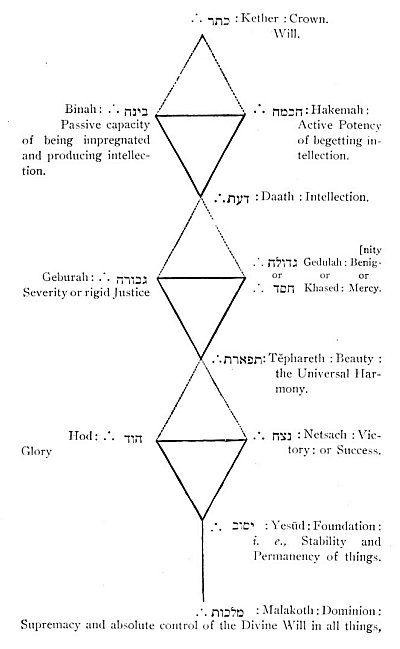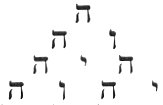This is what magic had been, from Zoroaster to Manes, from Orpheus to Apollonius Thyaneus; when positive Christianity, triumphing over the splendid dreams and gigantic aspirations of the school of Alexandria, publicly crushed this philosophy with its anathemas, and compelled it to become more occult and more mysterious than ever.
At the bottom of magic, nevertheless, was science, as at the bottom of Christianity there was love; and in the Evangelic Symbols we see the incarnate WORD adored in its infancy by three magi whom a star guides (the ternary and the sign of the microcosm), and receiving from them gold frankincense, and myrrh; another mysterious ternary, under the emblem whereof are allegorically contained the highest secrets of the Kabala.
Christianity should not have hated magic; but human ignorance always fears the unknown. Science was obliged to conceal itself, to avoid the impassioned aggressions of a blind love. It
p. 731
enveloped itself in new hieroglyphs, concealed its efforts, disguised its hopes. Then was created the jargon of alchemy, a continual deception for the vulgar herd, greedy of gold, and a living language for the true disciples of Hermes alone.
Resorting to Masonry, the alchemists there invented Degrees, and partly unveiled their doctrine to their Initiates; not by the language of their receptions, but by oral instruction afterward; for their rituals, to one who has not the key, are but incomprehensible and absurd jargon.
Among the sacred books of the Christians are two works which the infallible church does not pretend to understand, and never attempts to explain,–the prophecy of Ezekiel and the Apocalypse; two cabalistic clavicules, reserved, no doubt, in Heaven, for the exposition of the Magian kings; closed with Seven seals for all faithful believers; and perfectly clear to the unbeliever initiated in the occult sciences.
For Christians, and in their opinion, the scientific and magical clavicules of Solomon are lost. Nevertheless, it is certain that, in the domain of intelligence governed by the WORD, nothing that is written is lost. Only those things which men cease to understand no longer exist for them, at least as WORD; then they enter into the domain of enigmas and mystery.
The mysterious founder of the Christian Church was saluted in His cradle by the three Magi, that is to say by the hieratic ambassadors from the three parts of the known world, and from the three analogical worlds of the occult philosophy.
In the school of Alexandria, Magic and Christianity almost take each other by the hand under the auspices of Ammonius Saccos and Plato. The dogma of Hermes is found almost entire in the writings attributed to Dionysius the Areopagite. Synesius traces the plan of a treatise on dreams, which was subsequently to be commented on by Cardan, and composes hymns which might serve for the liturgy of the Church of Swedenborg, if a church of illuminati could have a liturgy.
To this epoch of ardent abstractions and impassioned logomachies belongs the philosophical reign of Julian, an illuminatus and Initiate of the first order, who believed in the unity of God and the universal Dogma of the Trinity, and regretted the loss of nothing of the old world but its magnificent symbols and too graceful images. He was no Pagan, but a Gnostic, infected with
p. 732
the allegories of Grecian polytheism, and whose misfortune it was to find the name of Jesus Christ less sonorous than that of Orpheus.
We may be sure that so soon as Religion and Philosophy become distinct departments, the mental activity of the age is in advance of its Faith; and that, though habit may sustain the latter for a time, its vitality is gone.
The dunces who led primitive Christianity astray, by substituting faith for science, reverie for experience, the fantastic for the reality; and the inquisitors who for so many ages waged against Magism a war of extermination, have succeeded in shrouding in darkness the ancient discoveries of the human mind; so that we now grope in the dark to find again the key of the phenomena of nature. But all natural phenomena depend on a single and immutable law, represented by the philosophal stone and its symbolic form, which is that of a cube. This law, expressed in the Kabala by the number 4, furnished the Hebrews with all the mysteries of their divine Tetragram.

Moe is the founder of GnosticWarrior.com. He is a father, husband, author, martial arts black belt, and an expert in Gnosticism, the occult, and esotericism.






